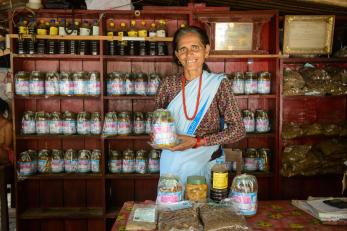A smart matriarch turns pickles into profit

In the dry, hot western region of Nepal, a tiny shop offers a unique and delicious refreshment: green mango pickles made by Harikala Yogi and her family. The pickles are the best in the region, and the Yogi family is thriving thanks to the quiet strength of Harikala, the family leader.
Harikala, 59, is an unlikely entrepreneur. She never went to school, and she married her husband Hari Shankar at just 13. This is a common story in rural Nepal, where family and marriage are often prioritized over education for young girls. Entering the world of business is not encouraged.
When they were first married, her husband Hari Shankar spent time traveling in neighboring India and discovered the popularity of pickled mangoes. When he returned home to Nepal, he suggested to Harikala that they start a small pickle business of their own.
Some pickles were already available in Nepal, but they were hard to come by and used dangerous preservatives. Hari Shankar and Harikala knew they could create a better, and more natural, recipe. Nervously, they took out a loan through the local village savings and loan association that Mercy Corps started.
The couple tried many different combinations of spices and preservatives before landing on just the right recipe, which they still use today. The small loan from the savings group helped them open their shop, but it took Harikala some time to get used to the idea.
“I was nervous the pickle business wouldn’t quite make it. I waited to see the money come in before I really believed in the business,” she says. But the pickle shop did start bringing in money, and Harikala saw the potential it had to help her family.
Harikala slowly took on more responsibility with the pickle business, learning to manage the recipe and handle the money herself.
In Nepal, where girls are marginalized and often discouraged from attending school, a woman in business is a rare sight. “When I was young, I never thought I would run a business,” she says. “If I could have started earlier, I could have done even more.”
After a few years, Harikala was all in — the pickle shop was doing well and she was becoming a full-fledged leader of the family business. The family expanded the pickle shop by adding new seasonal pickle varieties, dried herbs, lemon sauce and local honey.
Harikala and Hari Shankar’s pickles have gained a reputation as the best in the area. An organic store in Dhanghadi, the largest town in the region, discovered the family’s pickles and thought the same thing — they now regularly stock Harikala’s pickles in the store, boosting the family’s income even more.
Now, the entire family is involved in the pickle shop business, and Harikala has turned her dream into a reality. “If the whole family works at the shop, we can all be together and live close. My son doesn’t have to travel elsewhere to look for work,” she says.
With Harikala’s quiet and confident leadership, the family makes decisions together about reinvesting profits in the business. Since the pickle shop began, the family has taken out 120,000 rupees in loans that have all been paid off.
The profits from the shop fully support six people in the family and send all the grandkids to school — something that Harikala knows is important, especially for young girls. “It is better not to drop your studies. If you’re educated, you can earn better profits,” she says. “I would like to encourage every girl to study.”
Harikala’s health is starting to fail her, so she now oversees the shop and leaves the heavy lifting to her children. But her positive legacy already reaches beyond the pickle shop and her own family.
For years, Harikala has been a volunteer health worker in her community. She goes door-to-door to provide health information to pregnant women and lactating mothers. This work helps dispel common health myths that have been passed down through generations.
“I feel happy volunteering because we didn’t have this kind of training when I was young, and we didn’t know these things,” Harikala explains. “I like knowing that these mothers and children will be healthier.”
The pickle shop is doing its part to better the community, too. While Harikala volunteers and oversees the shop’s operations, her husband Hari Shankar is spreading their pickling expertise to others who want to follow in the Yogi family’s footsteps.
He trains local farmers to pickle green mangoes, and even shares most of the family recipe with them. He says he doesn’t worry too much about competition and enjoys teaching others how to turn the sweet fruit into a pickled delight. He assures us that he doesn’t give everything away. “Coca-Cola doesn’t share their recipe,” he jokes.
What was once just a small idea is now what Harikala dreamed it could be — a collaborative family business and a positive example for the community. For young girls in her village, Harikala’s unlikely success is a powerful inspiration.
Harikala knows that her time to lead the business will eventually come to an end, but she’s content knowing that it brought her family together.
When she smiles, her gentle strength shows. “I am so proud that my family is involved in the business together.”
We recently learned of Harikala's passing, and our thoughts are with her family, friends and community. Her story is one of grace, strength and determination, and her positive legacy lives on. The pickle shop is still going strong — Harikala's family is running the business now, just as she had once dreamed.


